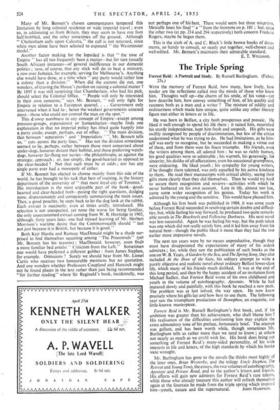Imperial and Colonial
The Concept of Empire : Burke to Attlee. Edited by George Bennett. (Black. 18s.) The Concept of Empire : Burke to Attlee. Edited by George Bennett. (Black. 18s.) Tins series of documentary anthologies of The British Political Tradition, as the general editors explain, includes volumes of two kinds : on a particular crisis, such as Mr. Beloff's Debate on the American Revolution ; or on a chosen theme over a longish period, like Mr. Joll's Britain and Europe (1793-1940), to which Mr. Bennett's volume is akin, not only in the attempt to trace a tangled thread across a considerable stretch of time (in his case from 1774 to 1947), but also because it has been essayed, necessarily, from the centre. Whereas British foreign policy may sometimes have been contrived in London—as it were, irrespective of foreigners—no serviceable imperial polity could be invented in Whitehall (although it was some- times attempted) irrespective of colonials.
Any collection of speeches and papers mainly composed in the United Kingdom is thus in danger of becoming a " concept " with much of the " Empire " left out. Most colonial history, if not most imperial policy, has been made by the competing pressures of the Treasury and the Admiralty (the latter's part being adequately emphasised too rarely) and, at the other remove, of a " frontier soldier, an over-zealous missionary, a pushing trader," the forces, white or coloured, on the periphery. Yet these documents, in the main, perforce omit such formative factors, both nether and upper millstone of the imperial process. We receive, of course, the inter- jection from the outskirts, early on, Hastings and Wellesley from Calcutta, Raffles from Malacca or, later, Milner from Johannesburg and Curzon from Bombay ; but Wakefield's Letter from Sydney was written not in New South Wales but in Newgate, just as Goldwin Smith's growl from Toronto might have come as readily from Manchester. Many of Mr. Bennett's chosen commentators tempered this limitation by long colonial residence or wide imperial travel ; even so, in addressing us from Britain, they may seem to have one foot half-hobbled, and the other sometimes off the ground. Although " Cheltenham calls upon Calcutta," the call is not returned, since white men alone have been selected to expound " the Westminster model."
Another factor making for the lopsided is that " the tone of Empire " has all too frequently been a matter—but for rare (usually South African) instances—of general indifference in our domestic politics ; save, of course, that any stick will do to beat a ministry, a row over Jamaica, for example, serving for Melbourne's. Anything else would have done, at a time when " any party would rather lose a colony than a division." When did the custom die out, one wonders, of traving the House's pardon on raising a colonial matter ? By 1895 it was still surprising that Chamberlain, who had his pick, should select the Colonial Office. " People will only be interested in their own concerns," says Mr. Bennett, " will only fight for Empire in relation to a European quarrel. . . . Government only intervened when it had to ; hence the weakest governments annexed most—those who could not control the man on the spot."
This thowsy numbness to any concept of Empire—except among pressure-groups, expansionist or humanitarian—maybe finds one explanation in that no imperial policy has fitted quite happily into a party credo, except, perhaps, out of office. " The main division, that between separatists ' and Imperialists ' ", Mr. Bennett tells us, " cuts across the party lines." Has not the division sometimes seemed to lie, perhaps, rather between those most concerned about under-dogs, however distant their habitat, and those preferring watch- dogs, however far-flung our navies—the philanthropic, as against the strategic, approach ; or, too simply, the good-hearted as opposed to- the clear-headed ? Not that such must be at odds ; nor has any single party ever had a monopoly of either.
If Mr. Bennett has elected to choose mainly from this side of the world, he has brought to his task that best of training, in the history department of the university of " that most loyal city of Toronto." His introduction is the most enjoyable part of the book—good- hearted and clear-headed both—posing the right questions, dodging none, dispassionately and competently summarising the main issues. Then, a good poacher, he steps back to let the dog look at the rabbit. Each extract is succinctly, even at times aridly, introduced. His selection is not unexpected, yet none the worse for being familiar, the only unaccustomed extract coming from W. B. Hornidge in 1903, although, forty years later, one had missed learning of Mr. Herbert Morrison's wartime desire that the Commonwealth should " last not just because it is British, but because it is good."
Both Keir Hardie and Ramsay MacDonald might be a shade sur- prised to find themselves squatting among "The Proconsuls" (yet Mr. Bennett has his reasons) ; MacDonald, however, soon finds a more familiar bed amidst " Criticism from the Left." Sometimes one would have preferred a different gobbet : from James Stephen, for example. Omissions ? Surely we should hear from Mr. Lionel Curtis who receives two honourable mentions but no quotation. And one wonders whether Professors Coupland and Hancock might not be found places in the text rather than just being recommended "for further reading" where Sir Reginald's book, incidentally, was not perhaps one of his best. There would seem but three misprints. Metcalfe loses his final " e 'from the footnote on p. 181 ; but, since the other two (at pp.-214 and 294 respectively) both concern Frederic Rogers, maybe he began them.
This is the sixth of A. and C. Black's little brown books of docu- ments, so handy to consult, so neatly put together, well-chosen and well-edited. Mr. Bennett's maintains their admirable standard.
E. T. WILLIAMS.



































 Previous page
Previous page